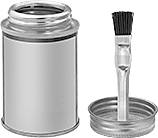About Sealant Flexibility
More
Non-Hardening Thread Sealants with PTFE

PTFE provides a slippery surface that keeps threads from binding. These sealants never fully harden, remaining pliable enough to self-heal and stop leaks before they start, so they’re often used in high-vibration applications that could cause standard thread sealants to fail. Since they have low locking strength, these sealants can be adjusted without tools.
Sealants that meet NSF/ANSI 61 adhere to safety standards for drinking water systems.
Container | Max. Pressure, psi | |||||||||
|---|---|---|---|---|---|---|---|---|---|---|
| Size, fl. oz. | Type | For Fluids | For Gases | Temp. Range, °F | For Max. Thread Dia. | Consistency | Specifications Met | Color | Each | |
Low Locking Strength | ||||||||||
Slic-Tite Sealants | ||||||||||
| 4 | Brush-Top Can | 10,000 | 3,000 | -50° to 500° | 2" | Paste | NSF/ANSI 61, UL Listed | White | 0000000 | 000000 |
| 8 | Brush-Top Can | 10,000 | 3,000 | -50° to 500° | 2" | Paste | NSF/ANSI 61, UL Listed | White | 0000000 | 00000 |
| 16 | Brush-Top Can | 10,000 | 3,000 | -50° to 500° | 2" | Paste | NSF/ANSI 61, UL Listed | White | 0000000 | 00000 |
| 32 | Brush-Top Can | 10,000 | 3,000 | -50° to 500° | 2" | Paste | NSF/ANSI 61, UL Listed | White | 0000000 | 00000 |
Drip-Free Non-Hardening Thread Sealants with PTFE
Apply these thread sealant sticks without a mess. They contain PTFE, which provides a slippery surface that keeps threads from binding. These sealants never fully harden, remaining pliable enough to self-heal and stop leaks before they start, so they’re often used in high-vibration applications that could cause standard thread sealants to fail. Since they have low locking strength, these sealants can be adjusted without tools. They meet NSF/ANSI 61 for use with drinking water.
Container | Max. Pressure, psi | ||||||||||
|---|---|---|---|---|---|---|---|---|---|---|---|
| Net Weight, oz. | Type | For Fluids | For Gases | Temp. Range, °F | For Max. Thread Dia. | Consistency | Specifications Met | Environment | Color | Each | |
Low Locking Strength | |||||||||||
Slic-Tite Sealants | |||||||||||
| 1.2 | Stick | 5,000 | 500 | -50° to 350° | 2" | Semi-Solid | NSF/ANSI 61 | Food Industry | White | 0000000 | 000000 |


























